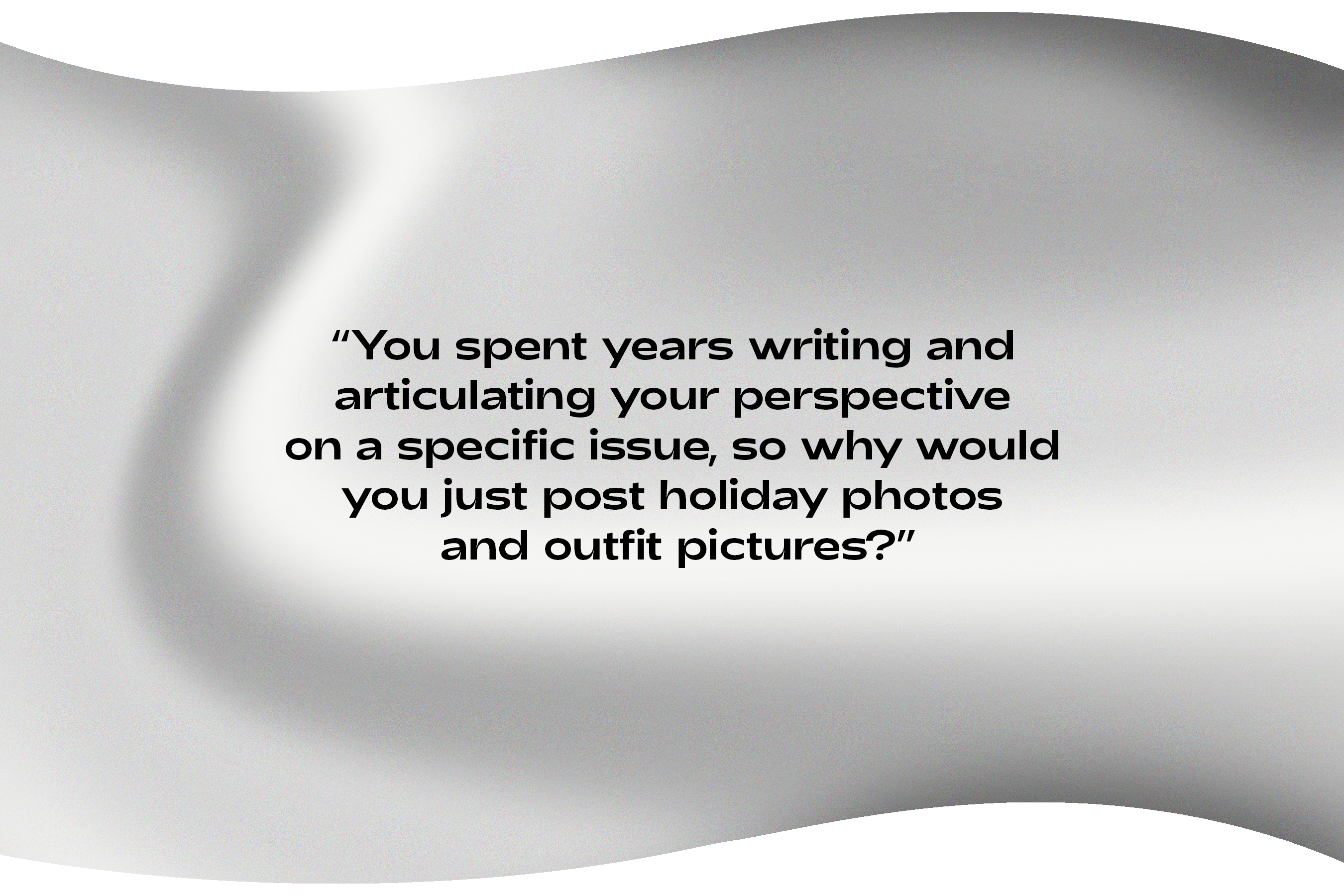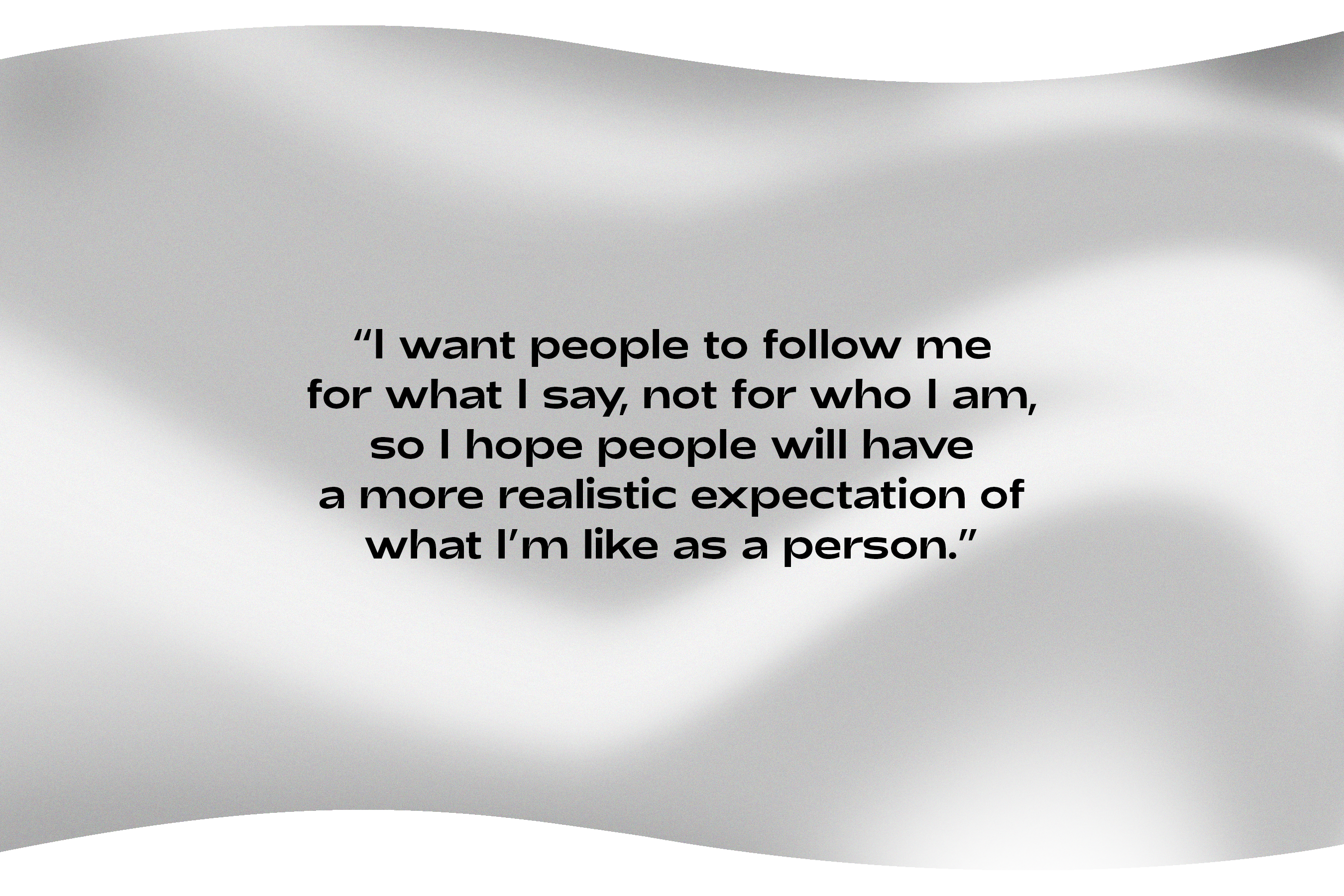The author of The World Is On Fire But We’re Still Buying Shoes shares his take on self-promotion, the importance of keeping it real, and of being active on social media.
For most creatives, self-promotion is as elusive and uncomfortable as it is necessary. Whether you’re getting a new podcast off the ground, releasing your first single, or transitioning to a freelance career in writing, doing the work—the actual work—isn’t enough. To attract new opportunities (in today’s creative economy) you’ll need people to see, share, question, hate, hopefully love, and ultimately remember your work and profile.
Unfortunately, the art of making people care doesn’t follow a fixed set of rules. So what is the best approach? According to fashion critic Alec Leach, using social media to market your ideas rather than your private identity is a good place to start. Not one to seduce potential clients with holiday reels, the author of Future Dust—an Instagram space dedicated to the contradictions of sustainable fashion—, and former Highsnobiety editor recently published his first book.
Having financed and produced the book independently, Alec can closely monitor the number of copies he sells every day, which in turn, allows him to draw clear connections between the success of his social media content/activity and the success of the book, and thus continuously refine his tactics. We asked him to unpack his approach for us.
This is the second episode of Creative Approaches, where experienced creatives share reflections and actionable advice on navigating their careers. By highlighting different views and approaches, we hope to foster a more nuanced understanding of creative work.


“Self-promotion is about giving people a reason to care about what you do—and a reason to pay you. I try not to look at it so much as self-promotion, but more as giving context. I’m just one person in this space and I think it’s important to emphasize that, instead of pretending that I have all the answers to all the questions, because I don’t. I’d much rather people really respect me and what I do than quickly get bored of me, which is probably what happens if you spend all your time being the loudest person in the room but not really having anything to back up your thoughts.”

“I use social media to talk about stuff I find interesting and/or relevant. That’s kinda it. I post on Instagram, under my @future__dust account, and on LinkedIn—those are the two main platforms when it comes to work-related stuff. I wouldn’t say marketing myself comes naturally to me, I think of it more as a muscle. You gotta keep it working to be good at it. The more you do it, the more you’ll feel confident. It’s really about keeping in a routine and being regular—sure, some posts go off and some are a total flop, but you just gotta keep at it—that’s how I ended up with a pretty good following on Instagram. There wasn’t much of a strategy to it, I just kept posting over the years and people found it naturally. One thing I’m really careful about is not to chase numbers for the sake of it. It all comes down to being credible and saying what I believe, instead of just shouting all the time. I know Mark Zuckerberg wants me to be chasing engagement 24/7, but that’s not what I’m about so I’m not going to do it.”

“Since I published my book myself, I’m able to track exactly how many copies I’m selling on a given day. There’s definitely a spike in sales whenever I have a post that goes off on Instagram, and sometimes LinkedIn, but my following’s much smaller there. The funny thing is, having someone with a big follower count post about the book sells a lot more copies than, say, getting featured in GQ or Business Of Fashion. Those are such good platforms for legitimizing what I do and I’m so happy that I get the chance to put my voice on them, but when it comes to selling books, it comes down to being active on social. I’m amazed at how many authors I see out there who publish a book on a topic—especially when it’s non-fiction—, and you look at their profile and it’s just content about their personal life. Like, you spent years writing and articulating your perspective on a specific issue, so why would you just post holiday photos and outfit pictures? It all comes back to providing context around what you’re doing—you need to give people a reason to buy into what you do.”


“Sometimes, I get a bit worried that as my profile gets bigger I’ll get more pressure to conform to whatever peoples’ perspective is of me. For instance, I wrote a book about buying less stuff, but I still buy stuff. I didn’t give it up completely, and I don’t tell anyone else to do that either, but I worry that people will expect me to be some sort of minimalist sustainable monk that doesn’t buy anything new and never flies and lives this completely sustainable lifestyle, even though we all know such a thing doesn’t actually exist. That’s also a big reason for me not to center myself too much on my work—I want people to follow me for what I say, not for who I am, so I hope people will have a more realistic expectation of what I’m like as a person. I still love buying things, I still fly, and I still eat meat. I’m not perfect and I’m not pretending to be.”

“It all comes down to giving people a reason to care about what you do. It’s not enough to just go out there with a book, magazine, brand, product, whatever it is, and just expect people to care. You need to show why it’s meaningful and why people should care. I hate to use the word ‘authenticity’ because it’s become such a corporate marketing buzzword but that’s really what it’s all about.”
Alec Leach is a fashion critic, consultant, and strategist with a focus on sustainability. He is the founder of Future Dust, and the author of The World is On Fire But We’re Still Buying Shoes, an independently produced book that traces Alec’s own journey toward a better relationship with fashion while unraveling the many contradictions that surround the topic.
Graphics: Emely Wensky
Images courtesy of Carys Huws

